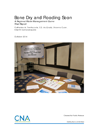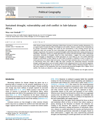-
Simulating Transboundary Water Conflict in South Asia, and the Effect of Drought on Civil Conflict in Africa
February 26, 2015 By Linnea Bennett Natural resource management is a trust issue. There’s no better illustration of this than a scenario exercise. A new CNA Corporation report, Bone Dry and Flooding, details a simulation they ran for transboundary water management in the Indian sub-continent. Players of the game – nationals of China, Pakistan, India, and Bangladesh who had all previously worked in politics, policy, or development – were given a hypothetical five-year time span to manage shared water resources. The game directors injected various political events and natural disasters, including two years of intense drought, two years of floods, and various local and national elections. The report highlights how difficult and complex transboundary natural resource management can be, concluding that trust does not naturally grow between countries sharing water but must be established through other means before they can engage in effective information sharing.
Natural resource management is a trust issue. There’s no better illustration of this than a scenario exercise. A new CNA Corporation report, Bone Dry and Flooding, details a simulation they ran for transboundary water management in the Indian sub-continent. Players of the game – nationals of China, Pakistan, India, and Bangladesh who had all previously worked in politics, policy, or development – were given a hypothetical five-year time span to manage shared water resources. The game directors injected various political events and natural disasters, including two years of intense drought, two years of floods, and various local and national elections. The report highlights how difficult and complex transboundary natural resource management can be, concluding that trust does not naturally grow between countries sharing water but must be established through other means before they can engage in effective information sharing. A study published in Political Geography explores if sustained drought increases the risk of civil conflict in sub-Saharan Africa, particularly in communities where livelihoods are dependent on rain-fed agriculture. After mapping rain-fed croplands and two decades of civil conflict outbreaks, Nina von Uexkull of Uppsala University writes that her results suggest drought “substantially increases the risk that a subnational region with rain-fed croplands will experience civil conflict events.” The report also explores how drought-driven conflict can have reverberating effects beyond its localized occurrence. “If economic deprivation is blamed on the government, this may translate into an increased propensity to engage in violence against the state,” von Oexkull writes. She concludes with a call for more research on how rebel groups and government manage drought during conflict, which can lead to better understanding of disaster vulnerability and conflict behavior.
A study published in Political Geography explores if sustained drought increases the risk of civil conflict in sub-Saharan Africa, particularly in communities where livelihoods are dependent on rain-fed agriculture. After mapping rain-fed croplands and two decades of civil conflict outbreaks, Nina von Uexkull of Uppsala University writes that her results suggest drought “substantially increases the risk that a subnational region with rain-fed croplands will experience civil conflict events.” The report also explores how drought-driven conflict can have reverberating effects beyond its localized occurrence. “If economic deprivation is blamed on the government, this may translate into an increased propensity to engage in violence against the state,” von Oexkull writes. She concludes with a call for more research on how rebel groups and government manage drought during conflict, which can lead to better understanding of disaster vulnerability and conflict behavior.Sources: CNA Corporation, Political Geography.
 A Publication of the Stimson Center.
A Publication of the Stimson Center.





